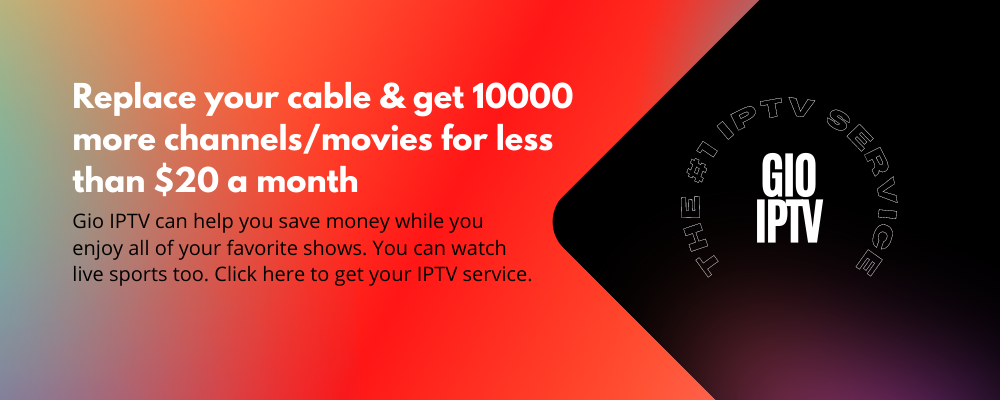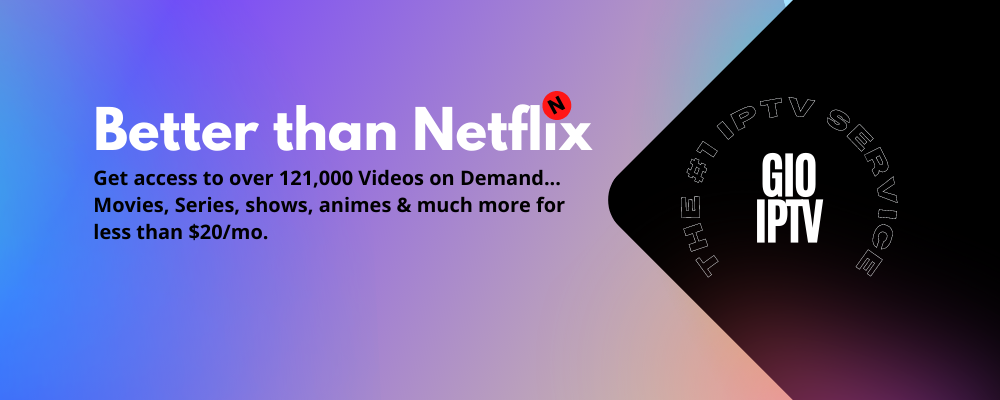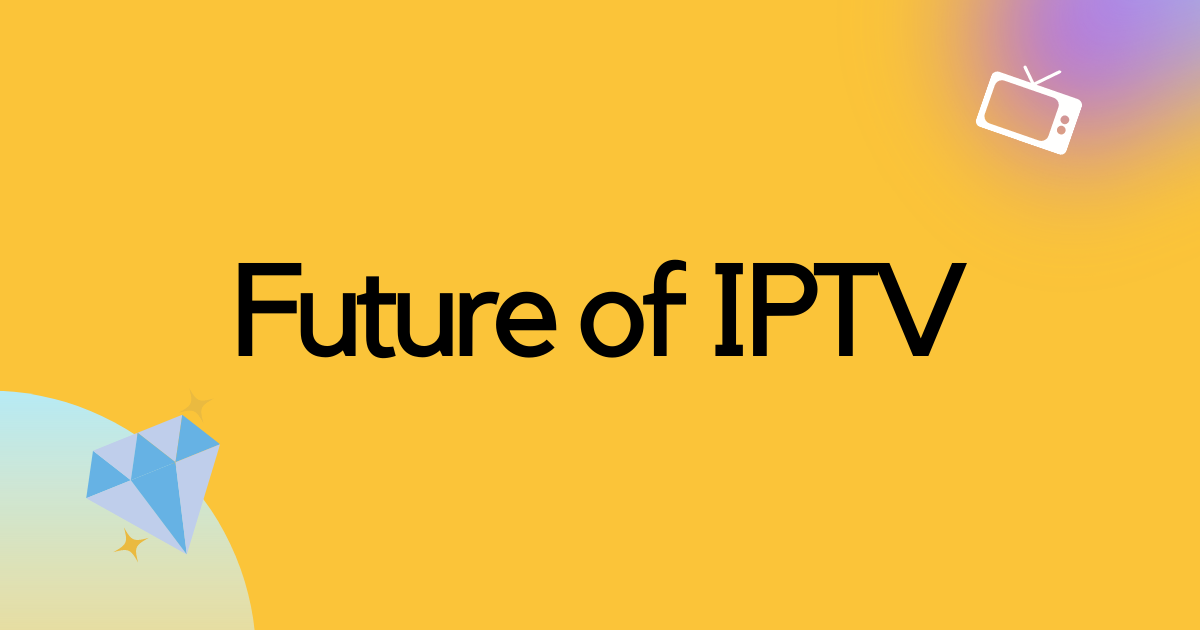As you read this blog, it is safe to assume that you stream your favorite shows, movies, and TV channels via IPTV. However, your curious mind wants to know more about IPTV. And also, in an era of developing technology, how IPTV would transform and where would it go? That’s why this blog is here to tell you what is the future of IPTV.
Well, I’m sure there’s some misunderstanding about the terminology in the futures market. IPTV, in the traditional sense, does not include web-based video streaming. That’s what I’d term OTT (Over the Top) video or Internet Television.
If you’re unfamiliar with the term, it’s the abbreviation for the Internet Protocol box. IPTV is a new technology in broadcasting. It allows users to view and record material via the internet. It’s a less expensive alternative to conventional lace connections and satellite systems.
Internet Protocol Television (IPTV) is a sort of digital television service. It has gained popularity due to its dependability. IPTV is a method of transmitting video across a network that is either unfettered or limited. When an ISP provides television services, this is referred to as IPTV.
Keep on reading the blog to know in detail about IPTV, what it is and how it is used, and most of all, the future of IPTV.
IPTV is a very interesting segment of IP technology. It is based on a distributed network of IP Servers. Each IPTV box has its own IP address, and the server is sending IP streams to each user. IPTV boxes are similar to a computer and can be connected to the TV or any other display device. The technology is cheap and universal and takes the function of set-top box, which is the equipment that connects TV to cable or satellite. These boxes are very easy to operate and are connected to the internet so users can enjoy any international channel that is broadcasted. This is really great news for international communities. It is a very powerful tool that lets users to watch channels of their choice, wherever they are.
What is IPTV?
IPTV, simply put, implies that television is transmitted (streamed) through the internet. IPTV may be delivered in two ways: over a closed or open network.
The feed is not broadcast over the public internet under closed network delivery. Instead, the stream is broadcast over a private network. And originates from a private internet protocol (IP) rather than a public IP.
Over-the-top (OTT) streaming refers to streaming that originates from a public IP address. Any television or film transmitted via the internet is referred to as OTT streaming. Traditional television broadcasting gets broadcast signals through a rooftop antenna, or satellite. At the same time, IPTV receives broadcast signals over the internet.
Standard broadcasting systems, such as fiber optic cable offer viewers pre-recorded programming. Consumers who use the best IPTV have more control over what and when they view it.
What is the definition of an IPTV set-top box?
IPTV set-top box is a digital television adapter which can receive IPTV signals. It is also a set-top box which can be connected to computer and display IPTV contents. Its advantage over traditional set-top boxes is that it has a bigger screen, uses less electricity and built with better graphics.
IPTV is a system which delivers TV programming over the Internet. The IPTV set-top box is a set-top box which connects to the Internet and receives content from the service provider. They usually have an Ethernet connection (but can also have Wi-Fi) and can decode a wide variety of video formats. They are designed to replace cable boxes.
You don’t need a set-top box to view IPTV on your computer or smartphone. Because computers and smartphones are already designed to receive and decode internet signals. This is not a problem. However, if you want to watch IPTV on your TV, you may require a set-top box.
Older televisions are not designed to receive and transform internet signals. A set-top box is an adaptor that transforms internet signals into television signals. Which can subsequently be seen on television.
The Internet Protocol Television or IPTV is a television technology that allows television contents to be delivered via the Internet. Instant, universal and interactive are some of the biggest advantages of IPTV. Through IPTV, users can access any content at anytime and from anywhere. Having said that, this technology is not mainstream yet, however it can be a huge hit in the near future. The future of IPTV depends on the advancements in the development and quality of the technology. As more people start using IPTV and it is accepted as an alternative to regular television, its popularity will increase.
How to use IPTV?
IPTV may be utilized in three distinct ways. We’ll go through each one in greater detail below.
Live TV
Many things, such as sporting events or award shows, are still best experienced live. IPTV allows you to watch live events from any internet-connected device. Whether you’re on the move or at home. In other terms, even if a person does not have a cable subscription or access, they may still watch live material using IPTV.
Time-shifted TV
This alternative walks the line between live television and video on demand. On occasion, there is content on television that a customer would want to see live but does not have the time to do so.
Consumers who watch time-shifted television can watch it somewhat behind schedule. But not too much behind schedule. They can, for example, watch an episode of their favorite late-night show the next morning if they miss one.
The border between VOD and time-shifted TV is fuzzy. In general, time-shifted TV refers to watching programming that has only recently been shown. Through set-top box. It’s especially handy for programming that wouldn’t be available on a streaming platform. Like talk programs and game shows.
Video on Demand (VOD)
As opposed to live television, VOD allows consumers to watch movies and series on demand. You’re already familiar with VOD streaming behemoths like HBO. IPTV — and, for that matter, VOD — both began with this type of material.
IPTV examples
There are a lot of IPTV content suppliers nowadays. Some companies, such as Verizon Fios, Sling TV, and Spectrum TV streaming, are older. These services are more akin to the set-top box form of IPTV. They are increasingly moving away from that and toward flexible television, and content streaming.
GIO IPTV is also a IPTV service provider and one of the best out there.

As a business strategy, these services allow customers to purchase a base membership. And then purchase access to additional channels and content. This strategy is increasingly being seen on sites like Amazon Prime.
Other platforms, such as Hulu Live TV, are VOD services are branching out into IPTV. Hulu, in particular, has cut out a place for itself in live sports programming. Other services, such as Iconic Streams, are newcomers vying for a piece of the IPTV pie.
This is to imply that IPTV has infiltrated a wide range of video distribution firms and channels. And is likely to do so in the future. IPTV may have a longer history, but it is still evolving and developing.
The IPTV market is still in its infancy. There are a lot of changes going on, which is why it is really hard to predict it. The last report I’ve seen shows that IPTV usage is growing by 17% per year. The most common IPTV service is the video on-demand one. Today’s cable TV companies use it to offer their programming. The IPTV service providers also use it to offer their programming as well.
It’s most likely that the IPTV service providers will use the technology to offer traditional live TV service. Such a service is much easier to get from the IPTV provider, than from any other cable TV company. I expect the IPTV live TV service to be very popular in the U.S. in the next few years. I think that the IPTV service providers will start to offer voice services in the next few years, as well. They already have the infrastructure to do such a thing.
What does IPTV’s future hold?
In my perspective, IPTV has a bright future. OTT (over-the-top) television is like a huge city. You’ll find what you’re looking for, but you may have to go around a little to get what you want.
In short, you get a mixed bag of outcomes and your business grinds to a standstill. The concept of having distinct applications for everything appeals to content producers. But it is inconvenient for clients because IPTV requires the use of many suitable apps.
We can’t predict where IPTV will go, but we can make educated guesses. Consumer desire for personalized, flexible TV viewing, by broadcast network schedules, is soaring now more than ever. IPTV is becoming more popular as a result of this.
IPTV is expected to expand to $67.6 billion in market size by 2027, according to Grand View Research. And with an annual growth rate of 7.1 percent. Mordor Intelligence is even more enthusiastic. Forecasting $104.25 billion in revenue by 2025, with a CAGR of 16.9%.
Latin America is the market with the quickest growth, while Asia Pacific is the largest. Given Asia Pacific’s low internet penetration rate of 57 percent. This is extremely intriguing (for comparison, Europe has a penetration of 89 percent). As a result, Asia Pacific is the largest market, with a lot of room for growth.
IPTV’s transition away from hardware, like set-top boxes and toward consumption of technologies like tablets and smartphones will drive this development. Consumers will increasingly consume media on the go. Becoming more mobile-centric and less reliant on televisions and PCs.
This is due to a rise in the number of people who own a smartphone in general. By 2025, Projection says that three-quarters of the world’s internet users — all 3.7 billion of them — would use their smartphones to access the internet.
These new internet users may live in countries where the set-top boxes may not be available. China, India, Indonesia, Nigeria, and Pakistan will witness the most increase.
Also, it’s worth noting that, in reaction to these developments, nations like China and India are creating even more IPTV-ready content. Therefore, optimizing for mobile, internet-based IPTV consumption offers the best prospects for IPTV.
IPTV’s key selling point, rather than its VOD capabilities, is to be its capacity to offer live TV in the future. The advantage of OTT transmission of older material is that it does not require special gear. Which is advantageous in an increasingly mobile environment.
However, there will always be a need for live material. And IPTV can remain a market leader if it can take use of its advantages in distributing that live content. IPTV has come long from its inception in the early 1990s. And it has undergone several changes and modifications since then.
It will have to adjust even more to the new normal of mobile-based consumption in order to thrive in the future. Only time will tell how it will come out.
Future of IPTV Services
Technological advancements have increased the number of Internet Protocol Television subscribers. Necessitating the creation of UHD, HD, and FHD channels, as well as Video on Demand (VOD).
The number of subscribers is also increasing, which is due to new requests as well as growth. The industry is expected to be driven by increased use of Internet-based streaming services.
Companies are combining complicated deliverables with Over The Top (OTT) services. Like video chatting or conferencing, video gaming, and smart home technology. Similar business
tactics are enticing customers. And the number of subscribers is growing, propelling the IPTV industry to new heights.
Government initiatives in emerging nations such as Asia-Pacific are hastening the demise of internet protocol television. Still, there is competition from cable and satellite television. Particularly in poor and impoverished nations. They are restricting IPTV adoption to some extent owing to cheaper costs. And also, a lack of framework for quality and hassle-free service.
IPTV is the future of Cable. I see it all over the place now. It’s not even so much that people are fed up with Cable anymore. I see people using IPTV much more often now. It’s a great way to get all of your TV channels without all of that extra cable. It’s much easier to flip through channels on an IPTV, especially if you have to pay extra for a DVR from your cable company. Cable is just way too expensive sometimes and I can’t justify paying for it anymore. I think that IPTV will grow in popularity and eventually the Cable companies will be forced to come up with more competitive plans.
Internet Protocol Television (IPTV) is taking on many forms, including IPTV set top boxes, IPTV streaming, and other alternatives. Regardless of the form it takes, IPTV is a technology that will inevitably become more commonplace as time progresses. As a result, the technology is evolving and becoming more affordable for the average consumer, who will be left with the option of choosing between cable and IPTV.
IPTV is one of the most popular and revolutionary technologies in the world of television media, live streaming and broadcast. IPTV allows users to watch TV directly from the internet without the need for a satellite or cable provider, which adds a level of convenience to the viewing experience for the user. The IPTV is much popular in Europe than any other place in the world. More than 100 countries have adopted the use of IPTV.
The IPTV industry is on fire. New services are being deployed and are becoming available in almost every market. HDTV penetration is still below 20% in North America and only a few percent of homes have access to high-speed internet. However, this is expected to change significantly during the next few years. The industry has already been growing at a tremendous rate and the future holds even greater opportunities.
Conclusion
Traditional television will, however, continue to dominate for a little longer. New IPTV systems are primarily responsible for the growth of the TV market. In the future, the high quality of this broadcast model will continue to attract more clients. In addition, the internet has become such an important part of everyone’s life. IPTV services will continue to play an essential role. Especially in domestic entertainment for a long time.
IPTV is the future, but it has its challenges . There are many technological challenges that have to be met. First, you have to make sure there is enough bandwidth for video. Second, the content must be produced in an IP format. Third, the content must be protected to prevent unauthorized copying and redistribution.
Televisions are slowly but surely losing their popularity in the world. People are no longer confined to their homes to watch their favorite programs; on the contrary, they can now watch them from anywhere thanks to the immensely popular IPTV.
IPTV network not only helps the cable industry to expand the business but also enables the cable industry to step into the future, eliminating the limitations of traditional cable TV. Today, most cable companies are investing in IPTV networks to expand their business. So what is the future of IPTV? IPTV is the future, period

